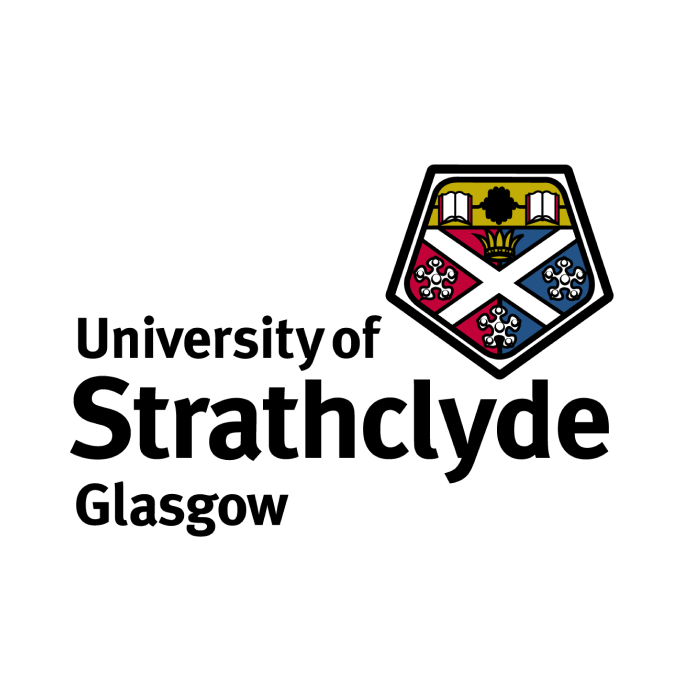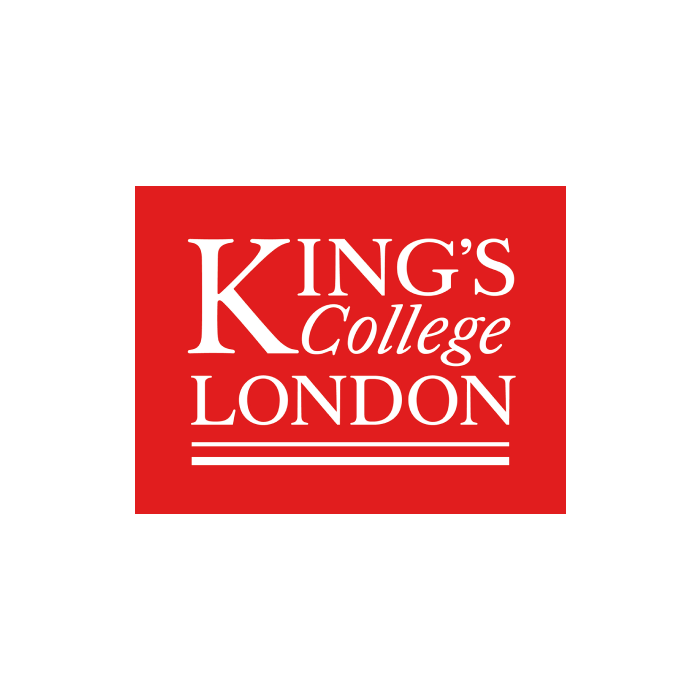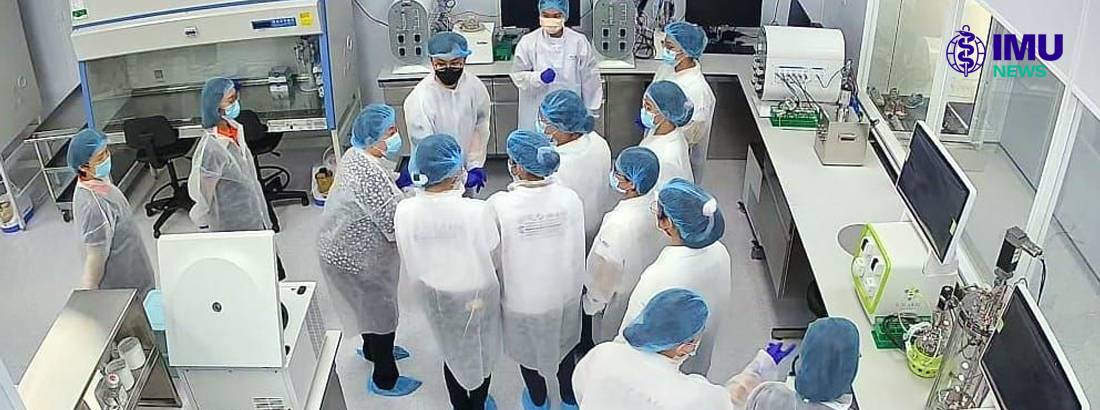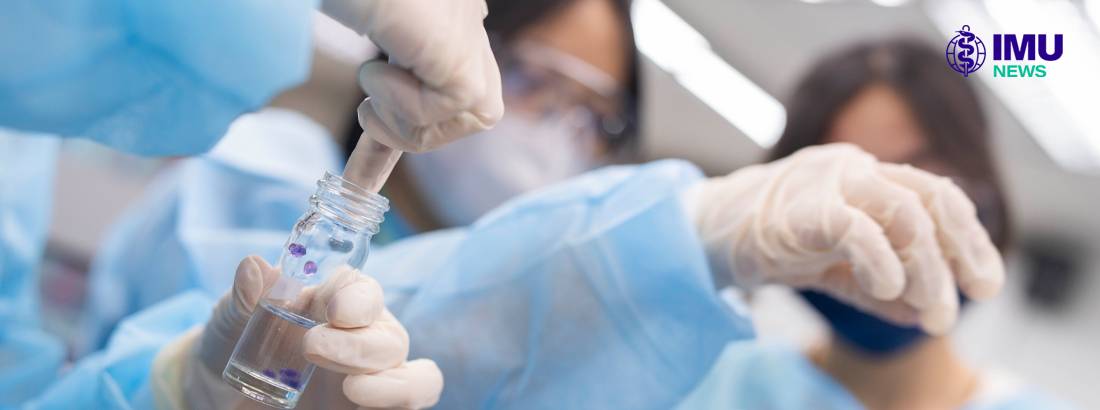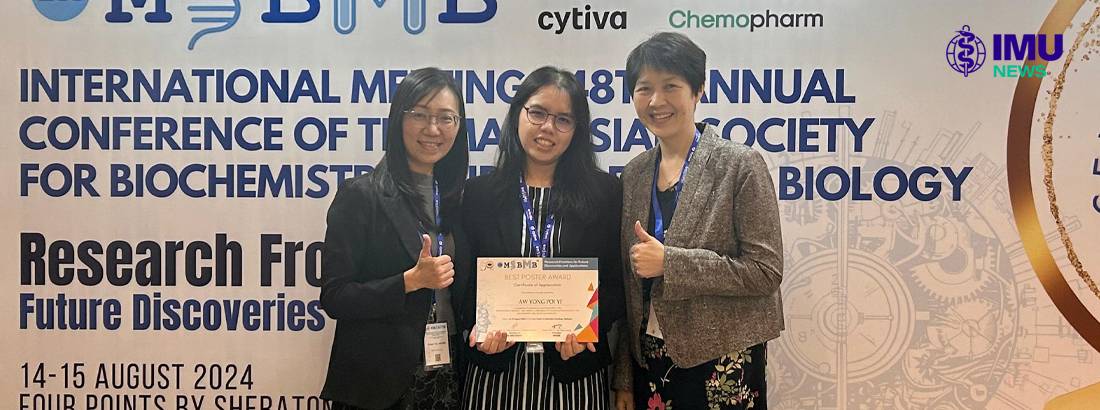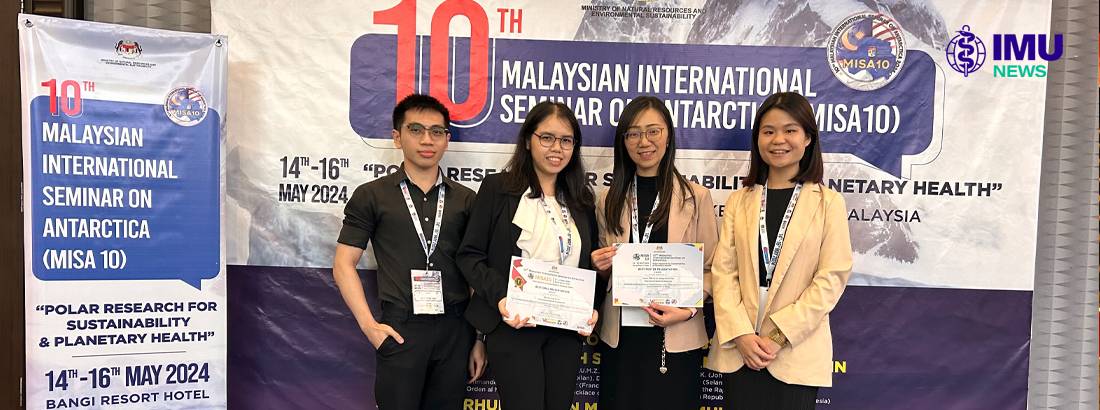Bachelor of Applied Science (Hons) in Medical Biotechnology
KPT/JPT(R2/545/6/0014)09/2027 | MQA/FA15505
Commencement
Jul & Sep
Degree/Duration
Bachelor of Applied Science (Hons) in Medical Biotechnology (IMU):
3 years
Degree from Partner Universities:
3.5 – 4 years
Explore the Field of Life
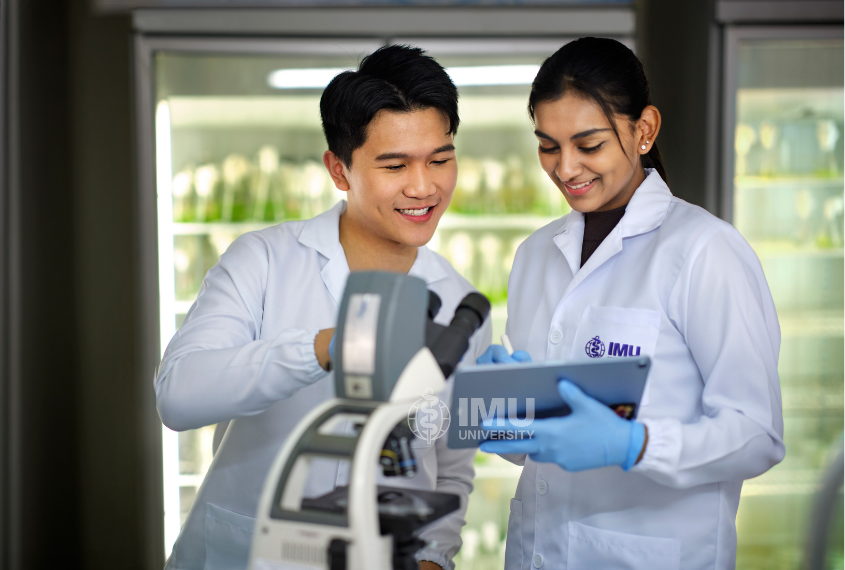
Dive deep into the realm of all living things. Medical Biotechnology is a great opportunity to learn how to use living organisms to develop products to help mankind live a long and more productive life. Equip yourself with IMU’s cutting-edge curriculum leveraging immersive tech-based learning modules, empowering you to navigate an ever-evolving industry. Gain the knowledge and skills to innovate the future with confidence.
Why Study Medical Biotechnology at IMU?
01
An Established Private Healthcare University
IMU is Malaysia’s first and most established private medical and healthcare university with over 30 years of dedicated focus in healthcare education. The IMU is placed under the Competitive (Berdaya Saing) category under SETARA 2022 for the third consecutive year.
02
Exposure to Entrepreneurship
With enterprise management as part of the curriculum, students will be able to have a better understanding of biotechnology-related business matters which can transform their future careers.
03
Build Your Future Healthcare Professional Network
With exposure to industrial attachment and research, students will be better prepared to be a competent biomedical scientist, upon graduation.
04
Well-Established Rapport with Biotechnology-Based Industries and the Bioeconomy Corporation
IMU works closely with biotechnology-based industries and the bioeconomy corporation for industrial attachments locally or abroad and latest information on the industry.
05
Curriculum Benchmarked to International Standards
IMU’s Medical Biotechnology curriculum is aligned with the Malaysian biotechnology priorities and it has been developed to meet high international standards and is accepted by University of Newcastle, Australia for credit transfer into their programme.
Entry Requirements
Pre-University Examination
Requirements
| Examinations | | | Requirements | ||||||
|---|---|---|---|---|---|---|---|---|---|
| A-Levels | CDD (including 2 Science subjects / Mathematics) AND Credit in Mathematics, one science subject and one other subject at SPM level or its equivalent. (This can be exempted if achieved the same result at Pre-University level) |
||||||||
| STPM | CC (including 2 Science subjects / Mathematics) AND Credit in Mathematics, one science subject and one other subject at SPM level or its equivalent. (This can be exempted if achieved the same result at Pre-University level) |
||||||||
| Australian Matriculation |
ATAR 60 (including 2 Science subjects / Mathematics) AND Credit in Mathematics, one science subject and one other subject at SPM level or its equivalent. (This can be exempted if achieved the same result at Pre-University level) |
||||||||
| NCEA Level 3 | 60% aggregate (including 2 Science subjects / Mathematics) AND Credit in Mathematics, one science subject and one other subject at SPM level or its equivalent. (This can be exempted if achieved the same result at Pre-University level) |
||||||||
| Canadian Grade 12/13 |
60% aggregate in 6 subjects (including 2 Science subjects / Mathematics) AND Credit in Mathematics, one science subject and one other subject at SPM level or its equivalent. (This can be exempted if achieved the same result at Pre-University level) |
||||||||
| Unified Examination Certificate (UEC) |
B in 5 subjects (including 2 Science subjects / Mathematics) AND Credit in Mathematics, one science subject and one other subject at SPM level or its equivalent. (This can be exempted if achieved the same result at Pre-University level) |
||||||||
| Australian University Foundation Programmes |
60% aggregate or ATAR 60 (including 2 Science subjects / Mathematics) And Credit in Mathematics, one science subject and one other subject at SPM level or its equivalent. (This can be exempted if achieved the same result at Pre-University level) |
||||||||
| Indian Pre-University | Average of 60% (including 2 Science subjects / Mathematics) AND Credit in Mathematics, one science subject and one other subject at SPM level or its equivalent. (This can be exempted if achieved the same result at Pre-University level) |
||||||||
| Ministry of Education Matriculation # |
cGPA 2.00 (including 2 Science subjects / Mathematics) AND Credit in Mathematics, one science subject and one other subject at SPM level or its equivalent. (This can be exempted if achieved the same result at Pre-University level) |
||||||||
| International Baccalaureate (IB) |
26 points (including 2 Science subjects / Mathematics) AND Credit in Mathematics, one science subject and one other subject at SPM level or its equivalent. (This can be exempted if achieved the same result at Pre-University level) |
||||||||
| American High School Diploma with Advanced Placement (AP) |
cGPA 2.00 AND Credit in Mathematics, one science subject and one other subject at SPM level or its equivalent. (This can be exempted if achieved the same result at Pre-University level) |
||||||||
| Foundation Studies # |
IMU Foundation in Science/ Foundation in Biosciences / Foundation in Engineering or equivalent cGPA 2.00 or 50% (including 2 Science subjects / Mathematics) AND Credit in Mathematics, one science subject and one other subject at SPM level or its equivalent. (This can be exempted if achieved the same result at Pre-University level) |
||||||||
| Degree | BSc in related field: cGPA 2.00 |
||||||||
| Diploma | | | Diploma in Science (UiTM), Diploma in Microbiology (UiTM) – cGPA 2.50 Diploma in related field – cGPA 2.00 |
||||||
CDD (including 2 Science subjects / Mathematics)
AND
Credit in Mathematics, one science subject and one other subject at SPM level or its equivalent.
(This can be exempted if achieved the same result at Pre-University level)
cGPA 2.00
AND
Credit in Mathematics, one science subject and one other subject at SPM level or its equivalent.
(This can be exempted if achieved the same result at Pre-University level)
ATAR 60 including 2 Science subjects / Mathematics
AND
Credit in Mathematics, one science subject and one other subject at SPM level or its equivalent.
(This can be exempted if achieved the same result at Pre-University level)
60% aggregate or ATAR 60 including 2 Science subjects / Mathematics
AND
Credit in Mathematics, one science subject and one other subject at SPM level or its equivalent.
(This can be exempted if achieved the same result at Pre-University level)
60% aggregate in 6 subjects including 2 Science subjects / Mathematics
AND
Credit in Mathematics, one science subject and one other subject at SPM level or its equivalent.
(This can be exempted if achieved the same result at Pre-University level)
BSc in related field: cGPA 2.00
Diploma in Science (UiTM), Diploma in Microbiology (UiTM) – cGPA 2.50
Diploma in related field – cGPA 2.00
IMU Foundation in Science/ Foundation in Biosciences / Foundation in Engineering or equivalent
cGPA 2.00 or 50%
(including 2 Science subjects / Mathematics)
AND
Credit in Mathematics, one science subject and one other subject at SPM level or its equivalent.
(This can be exempted if achieved the same result at Pre-University level)
# The duration of this programme must be a minimum of 1 year in the same accredited institution and foundation in other disciplines are accepted.
Average of 60% (including 2 Science subjects / Mathematics)
AND
Credit in Mathematics, one science subject and one other subject at SPM level or its equivalent.
(This can be exempted if achieved the same result at Pre-University level)
26 points (including 2 Science subjects / Mathematics)
AND
Credit in Mathematics, one science subject and one other subject at SPM level or its equivalent.
(This can be exempted if achieved the same result at Pre-University level)
cGPA 2.00 including 2 Science subjects / Mathematics
AND
Credit in Mathematics, one science subject and one other subject at SPM level or its equivalent.
(This can be exempted if achieved the same result at Pre-University level)
# The duration of this programme must be a minimum of 1 year in the same accredited institution and foundation in other disciplines are accepted.
60% aggregate (including 2 Science subjects / Mathematics)
AND
Credit in Mathematics, one science subject and one other subject at SPM level or its equivalent.
(This can be exempted if achieved the same result at Pre-University level)
CC (including 2 Science subjects / Mathematics)
AND
Credit in Mathematics, one science subject and one other subject at SPM level or its equivalent.
(This can be exempted if achieved the same result at Pre-University level)
B in 5 subjects (including 2 Science subjects / Mathematics)
AND
Credit in Mathematics, one science subject and one other subject at SPM level or its equivalent.
(This can be exempted if achieved the same result at Pre-University level)
Foundation in Science
-
- Foundation in Science qualifications from other higher education institutions will be considered on a case by case basis for admission into the local IMU programmes.
- Students with IMU Foundation in Science can apply into IMU programmes and programmes with selected credit transfer options, upon meeting the entry requirement eligibility. **
(Please refer to IMU Foundation in Science brochure for more details)
For admissions into the IMU Foundation in Science programme, students will need:
- Pass SPM / O-Levels with minimum 5 credits in Mathematics, 2 Science subjects and 2 other subjects.
Note: Specific SPM / O-Levels requirements may be needed for admissions into IMU programmes.
English Language Examination
Requirements
| Examinations | Requirements | ||
|---|---|---|---|
| MUET** | Band score of 3; or (For Malaysian students) |
||
| IELTS** | Overall band score of 5.5; or | ||
| TOEFL iBT** | Overall score of 46; or | ||
| Cambridge English: Advanced (CAE)** | Overall score of 162; or | ||
| Cambridge English: Proficiency (CPE)** | Overall score of 162; or | ||
| Cambridge Linguaskill** | Overall score of 160; or | ||
| Pearson Test of English (PTE)** | Overall score of 51; or | ||
| Credit Transfer | IELTS Overall band score of 7.0 | ||
Overall score of 162
Overall score of 162
Overall score of 160
IELTS Overall band score of 7.0
Overall band score of 5.5
Band score of 3
(For Malaysian students)
Overall score of 51
Overall score of 46
The following categories of students* are exempted from the English requirements:
Students who graduated from other institutions where the curriculum is delivered in English Language for example:
Advanced Levels / Australian Matriculation / Australian University Foundation Year / Canadian Matriculation / International Baccalaureate / Foundation in Science / Other Pre-University Programmes from Local Higher Education Institutions
*ONLY applicable to those who are completing the entire degree at IMU, Malaysia.
**Applicable to IMU local degree only.
Note: Please note that achieving the minimum Entry and English requirements as stated does not guarantee you admission into any of IMU’s programmes. Please refer to our Student Admissions Policy for more information.
Programme Structure
- Curriculum is reviewed periodically and subject to change.
- MPU modules are compulsory, imposed by the Ministry of Higher Education under the Private Higher Educational Institutions Act 1996 (Act 555).
- Every student must pass all modules as a prerequisite for the awarding of the degree.
Fee Structure
| Fee | Malaysian Student (RM) | International Student (RM) |
|---|---|---|
| Application Fee | 150 | 500 |
| Registration Fee | 850 | 2,000 |
| Refundable Caution Deposit | 1,000 | 1,000 |
- Application fee is payable upon submission of application
- Registration fee and refundable caution deposit are payable upon acceptance of the offer letter issued by the IMU Admissions Office
- As stipulated by the Malaysian Ministry of Education, international students are required to pay Student Visa Administration fee of RM3,000 AND personal bond (depending on nationality) upon registration
- International students will also be required to pay Student Visa Renewal fee every year
- Students must adhere to the Policy on Payment of Fees
- All students are required to pay Student Association Fee of RM40 per semester which will be subject to annual increase
- All fees are subject to currency exchanges rates and exclusive of levy and bridging fees (if any)
- Application fee and Registration fee is non refundable
- All students who are applying for the National Higher Education Fund (NHEF) loans are required to pay their semester fees in FULL by the due date stated in the invoice.
| Malaysian Student Tuition Fees |
International Student Tuition Fees |
Estimated Tuition Fees at Partner University |
|
|---|---|---|---|
| Bachelor of Applied Science (Hons) in |
6 semesters, 3 years | 6 semesters, 3 years | – |
| Medical Biotechnology (IMU) | RM22,300 per semester, | RM23,500 per semester, | – |
| Total Duration: 3 years | RM44,600 per year | RM47,000 per year | |
| Credit Transfer to | 3 semesters, 1.5 years | 3 semesters, 1.5 years | 4 semesters, 2 years |
| The University of Newcastle | RM22,300 per semester, | RM23,500 per semester, | AUD 45,490 per year |
| Bachelor of Biotechnology | RM44,600 per year | RM47,000 per year | |
| Total Duration: 3.5 years | |||
| Credit Transfer to | 6 semesters, 3 years | 6 semesters, 3 years | 2 semesters, 1 year |
| University of Strathclyde* | RM22,300 per semester, | RM23,500 per semester, | GBP 31,250 per year |
| MSc Industrial Biotechnology | RM44,600 per year | RM47,000 per year | |
| Total Duration: 4 years | |||
| Progression to | 6 semesters, 3 years | 6 semesters, 3 years | 2 semesters, 1 year |
| University of Strathclyde* | RM22,300 per semester, | RM23,500 per semester, | GBP 32,350 per year |
| MSc Forensic Science | RM44,600 per year | RM47,000 per year | |
| Total Duration: 4 years | |||
- *All IMU students transferring to University of Strathclyde and meet the eligibility criteria will be eligible for a 15% bursary. Applicable upon transfer to University of Strathclyde.

Our Industrial Partners
The curriculum structure is constantly updated to meet the ever-changing industries’ needs and includes research-led teaching to deliver evidence-based knowledge and practice in the industry. Students will have the opportunity to undergo industrial training in the related sectors in their final semester. They will also be able to collaborate with industry or/and researcher in related project in their final year.
Hear from Our Students and Alumni
Frequently Asked Questions
- Verified copies of your academic qualifications
- Evidence of English language proficiency
- A copy of your MyKad or the identification page of your passport
- Solid foundation in knowledge for biotechnology today and tomorrow
- Progressive development of technical skills from Year 1 to Year 3
- Opportunity to work in industry during internship
- Experience in original research work in an active environment
- Exposed to entrepreneurial skills and business communications
- Emphasis on diagnosis and drug discovery for diseases

Our Alumni: Journey Beyond Graduation
Our alumni today have embarked on diverse and promising career paths across various industries. They are a true testament to the versatility of their education, as they continue to excel in a wide range of professional healthcare fields.
Read Our Latest News & Stories
A Word From The Programme Director
A Word From The Programme Director
Have Questions? Ask Us
Explore Undergraduate Programmes Offered

Explore Undergraduate Programmes Offered
Taught Programme
 2024.png)






